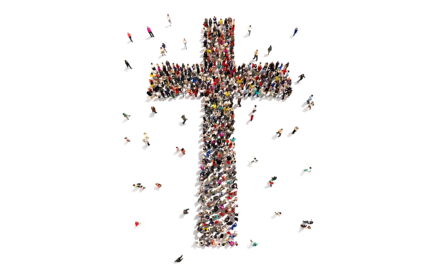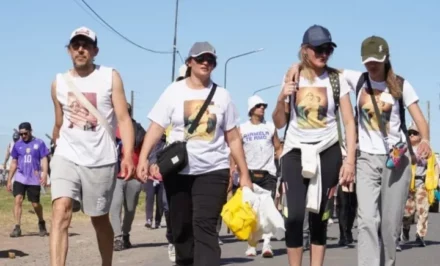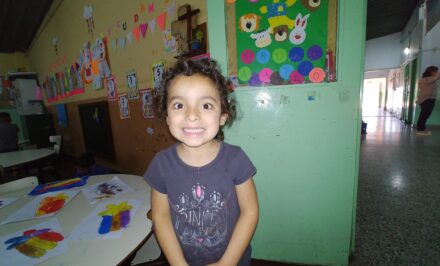 org. Every part of the Church, and many others outside of her – believers or non-believers – have received Pope Francis` clear and hope-filled words. They are also words that motivate us to assume the responsibility we all have to build a world in accordance to the Will of God, in the strength of the Spirit and through the way of Christ. Cardinals and bishops, priests, men and women religious, novices and seminarians, families, the youth and elderly, communities and institutes have received this challenge to go out “onto the street” to take – not a utopian hope – but concrete deeds in living evangelization projects to all men and women wherever they may be. And if they are on the “outskirts” then we have to go there, with all the risks and dangers it may include. He repeats to us constantly: I prefer an injured church, because she goes out to serve, to a Church that is sick because of her self-absorption. Testimony to this can be found in the section of Schoenstatt.org where on a weekly basis texts are selected which motivate us on our own pilgrimage toward the 2014 Jubilee. Undoubtedly, because we are the Church, these words are also directed to us. How happy must our Father not be with this missionary impetus which is given to us from the very heart of the Church! (Fr. José María García)
org. Every part of the Church, and many others outside of her – believers or non-believers – have received Pope Francis` clear and hope-filled words. They are also words that motivate us to assume the responsibility we all have to build a world in accordance to the Will of God, in the strength of the Spirit and through the way of Christ. Cardinals and bishops, priests, men and women religious, novices and seminarians, families, the youth and elderly, communities and institutes have received this challenge to go out “onto the street” to take – not a utopian hope – but concrete deeds in living evangelization projects to all men and women wherever they may be. And if they are on the “outskirts” then we have to go there, with all the risks and dangers it may include. He repeats to us constantly: I prefer an injured church, because she goes out to serve, to a Church that is sick because of her self-absorption. Testimony to this can be found in the section of Schoenstatt.org where on a weekly basis texts are selected which motivate us on our own pilgrimage toward the 2014 Jubilee. Undoubtedly, because we are the Church, these words are also directed to us. How happy must our Father not be with this missionary impetus which is given to us from the very heart of the Church! (Fr. José María García)
![]()
WEEK 42/2013

The Church is Catholic because she is universal. She has spread throughout the world and proclaims the Gospel to every man and every woman. She is not a group of elite and does not regard only a few. The Church has no closure, she is sent to all people and all of humankind. It is only the Church that is also present in the smallest parts of [the world].
General Audience, 9 October (unauthorised translation)
So many people have fallen away from the Church. It’s a mistake to put the blame on one side or the other, in fact, it’s not about talking about fault. There are responsibilities in the history of the Church and of her men, in certain ideologies and also in individual persons. As children of the Church we must continue on the path of Vatican Council II, stripping ourselves of useless and harmful things, of false worldly securities which weigh down the Church and damage her true face. There is need of Christians who render the mercy of God visible to the men of today, His tenderness for every creature. We all know that the crisis of contemporary humanity is not superficial but profound. Because of this the New Evangelization — while calling to have the courage to go against the current, to be converted from idols to the only true God –, cannot but use the language of mercy, made up of gestures and attitudes even before words.
Address to the Plenary Assembly of the Pontifical Council for Promoting the New Evangelisation, 14 October 2013 (Zenit)
No one is excluded from the hope of life, from the love of God. The Church is sent to reawaken this hope everywhere, especially where it is suffocated by difficult existential conditions, at times inhuman, where hope does not breathe but is suffocated. There is need of the oxygen of the Gospel, of the breath of the Spirit of the Risen Christ, to rekindle it in hearts. The Church is the house whose doors are always open not only so that everyone can find welcome and breathe love and hope, but also because we can go out and bring this love and this hope. The Holy Spirit drives us to go out of our enclosure and guides us to the fringes of humanity.
Address, 14 October 2013 (Zenit)
Who are the martyrs? They are Christians won by Christ, disciples who learned well the meaning of “loving to the end” that took Jesus to the Cross. There is no such thing as love in parts, in portions. Love is total: and when one loves, one loves to the end. On the Cross, Jesus felt the weight of death, the weight of sin, but he entrusted himself wholly to the Father and he forgave. He hardly spoke but gave his life. Christ goes before us in love; the martyrs have imitated him in love to the end.
The Holy Fathers say: “Let us imitate the martyrs!” We always have to die a bit to come out of ourselves, of our egoism, our wellbeing, our sloth, our sadnesses, and open ourselves to God, to others, especially the neediest.
Let us implore the intercession of the martyrs to be concrete Christians, Christians with works and not words; so as not to be mediocre Christians, Christians varnished with Christianity but without substance. [The martyrs] were not varnished; they were Christians to the end. Let us ask them for their help to maintain our faith firm, even if there are difficulties, and thus be leaven of hope and architects of brotherhood and solidarity.
Video message for the beatification of Spanish martyrs of the 20th century (Zenit)
Whoever suffers from the “Johah syndrome” – permit me to say it – is in search of a sanctity á la drycleaned clothes. Everything is beautiful, all is well made, but lacking that zeal to proclaim the good news. However in front of this generation that is sick from the “Jonah syndrome”, the Lord promises the sign of Jonah. The other version, that of Matthew, says: Jonah was inside the whale for three nights and three days, referring to Jesus in the tomb – his death and Resurrection – and that is the sign that Jesus promises, against hypocrisy, against this attitude of perfect religiosity, against this attitude of a group of Pharisees. The “sign of Jonah” gives us hope and confidence that we have been saved by Jesus’ blood. There are still many Christians who believe that they can only be saved by their own works. The works are important, but they are a result, an answer to that merciful love that has saved us. However, our works alone, without this merciful love, are useless. The “Jonah syndrome” only trusts in our personal righteousness, in our own works. And then the “Jonah Syndrome” leads directly to hypocrisy, that self-satisfaction of being a pure and perfect Christian, because we do these works, because we keep all the Commandments. That is a serious illness. The sign of Jonah is the mercy of God in Jesus Christ, who died and rose for us, for our redemption. In the first reading there are two sayings that connect with this. Paul says of himself that he is an Apostle, not because he has studied, but through being “called”. And he tells the Christians: You have been called by Christ. The “sign of Jonah” is a calling to all of us to follow the Lord. It applies to us all who are sinners. We must do it modestly and kindly. That is our calling, but at the same time also a choice we can accept, or not.
Sermon in Santa Marta, 14 October (Unauthorised translation)
The Church exists not just in the shadow of our church towers. On the contrary she embraces all peoples who profess the same faith and feed on the same Eucharist, and who are protected by the same shepherds. Feel in communion with all Churches, with all the small or large Catholic communities throughout the world. That is beautiful! And then feel that we are all on a mission, whether we are big or small communities, we all have to open our doors and go out for the Gospel. So let us ask: What am I doing to pass on to others the joy of meeting the Lord, the joy of belonging to the Church?
General Audience, 9 October (unauthorised translation)
That is the beautiful thing about the Church. Each one makes the contribution God has given him or her in order to enrich the others. This includes diversity that nevertheless does not lead to conflict, but is founded on a harmony that comes from the Holy Spirit. He is a true master, he himself is the harmony. So let us ask the following question: In our communities do we live in harmony, or do we fight? In my parish, in my Movement, where I am part of the Church, is there gossip? If there is gossip there is no harmony, but fighting. And that is not the Church. The Church is the harmony of all. Never let us talk badly about one another! Never fight! Let us accept the other; let us accept the fact that genuine diversity exists and that we can think in various ways. We can have the same faith and think differently – or do we want uniformity? Uniformity kills! The life of the Church is variety, and if we want this uniformity to gain the upper hand, we kill the gifts of the Holy Spirit. Let us pray to the Holy Spirit, the author of this unity in diversity, this harmony, so that he always makes us “more Catholic”, that is, ever more a part of this Catholic and universal Church. Thank you!
General Audience, 9 October (unauthorised translation)
See all texts in “Francis for the Pilgrims 2014”
![]()
The aim of the pilgrimage
is the renewal of the covenant of love
as a missionary and unifying creative force,
i.e. internally the renewal of the Schoenstatt Family
and externally the shaping of covenant culture.













